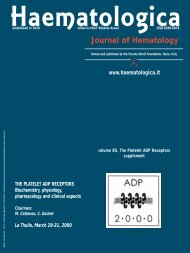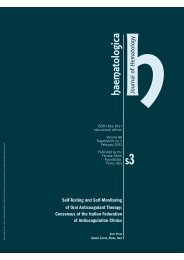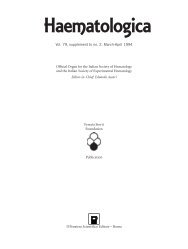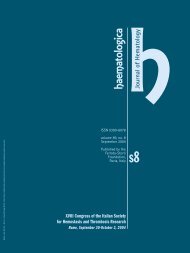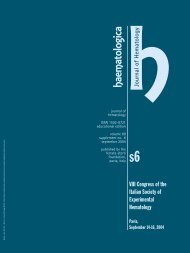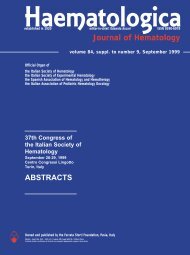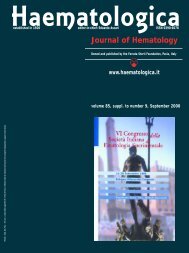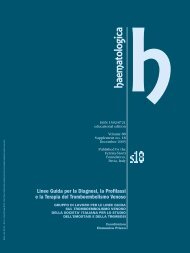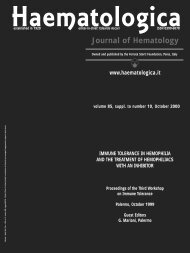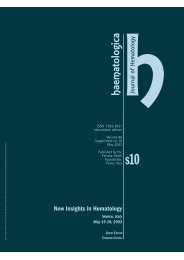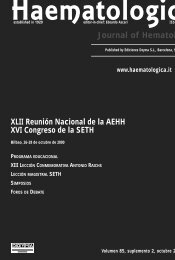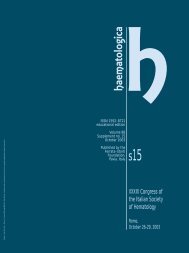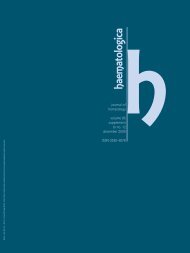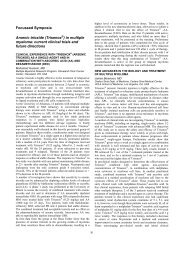102M.S. Vacchio et al.in circulation have been shown to be weakly positivefor expression of classical class I moleculessuggesting that upregulation may occur outsidethe placental environment. 17 Thus, maternal Tcells could conceivably encounter fetal antigensvia exported MHC-expressing trophoblasts presentin the maternal tissues (Figure 2a). Thiswould implicate the trophoblasts as potentialAPCs and provide a means by which peripheral Tcells could encounter fetally-derived antigens.Alternatively, cellular proteins from the fetallyderivedtissues may be presented to maternal Tcells after uptake by maternal professional APCs(dendritic cells, macrophages and B cells) andmigration to lymphoid organs, as has been proposedin the model of cross-presentation(Figure2b). 20There has been extensive discussion of Medawar’sproposal that the fetus represents nature’sallograft. 15 Viewing the fetus in the context of theimmune system's ability to distinguish self fromnonself, the fetus would fall under the category ofnon-self since many of the gene productsexpressed by the fetus may not even be encodedby the maternal genome and therefore, have neverbefore been encountered. Yet, the immune systemdoes not mount an immune responseagainst the fetus as it would a transplanted tissue.While there may be disparate MHC expressed,the dynamics of the interaction between themother and fetus are far different from that of aclassical allograft with the recipient immune system.Mature T cells in a non-inflammatory setting,for the most part, become tolerized uponencounter with antigen, whether self or foreign.Activation of T cells in response to antigen hasbeen proposed to depend on the presence of asecond danger signal, such as those generatedduring tissue destruction, 21,22 resulting in theactivation of APCs that would lead to inductionof T-cell effector function. However, during pregnancythere is not an immediate threat to themother posed by the fetus. The encroachmentand establishment of the fetus into the maternaluterus is invasive but with minimal tissue damageas compared to that of transplantation of atrue allograft, such as a transplanted kidney. Furthermore,the placental separation of maternal/fetalcirculatory systems and relatively lowlevels of allogeneic MHC class I and absence ofclass II antigens on the placenta would minimizethe amount of immediate antigenic challenge.This is in stark contrast to tissue transplants inwhich the recipient’s immune system is confrontedwith a potent antigenic challenge incombination with tissue damage and potentialadventitious pathogens. In view of the inflammatorysituation of tissue transplantation, theencounter of maternal T-cells with fetal antigenswould be more innocuous and seem to be littlemore than an encounter with a developmentally-regulatedor tissue-specific self-antigen.Encounter with the fetal tissues should thereforebe little different than encounter with any otherFigure 2. How do fetal antigens encounter maternal T cells?Maternal T cells can potentially encounter fetal antigens inseveral ways: either presentation via MHC-expressing trophoblaststhat escape into the maternal circulation (a) or“cross-presentation” of fetal antigens by maternal APCs (b).organ present in the mother. In addition, unlikea transplanted kidney, the fetus employs multiplemechanisms designed to ensure acceptanceby the maternal immune system. Given the noninflammatorynature of pregnancy, we proposethat maternal T-cell responses upon encounterwith fetal antigens during pregnancy may be representativeof how mature T cells respond uponencounter with self-antigens in the periphery.Therefore, we propose that maternal T cellswould become tolerized to fetal antigens ratherthan immunized against them during a normalpregnancy.T-cell tolerance to fetal antigensGiven our proposal that the fetal antigensmore closely resemble tissue-specific self-antigensthan alloantigens, we postulated that maternal Tcells should become tolerized to fetal antigens.Many people have attempted to characterize anylymphocytic changes that may occur in thematernal immune system in the hope of understandinghow these changes reflect maternalresponsiveness or tolerance to the fetus. Unfortunately,these studies have often yielded resultsthat are conflicting or difficult to interpret, withno firm consensus concerning the antigen-specificresponse to the fetus, primarily due to thedifficulty in interpreting changes in heterogeneousT-cell populations. 23-31 The generation ofTCR transgenic mice has allowed us to visualizethe fate of maternal T cells during pregnancy. Inthese mice, the majority, if not all of the T cellsexpress a transgenic TCR of known antigenicspecificity and MHC restriction. Therefore, thefate of T cells specific for a given antigen afterhaematologica vol. 88(supplement n. 12):september <strong>2003</strong>
IV International Workshop on Immune Tolerance in Hemophilia 103antigen exposure can be detected using anticlonotypicantibodies and flow cytometry. Withthis simple approach, the fate of fetal-specific Tcells can be clearly evaluated. We utilized pregnantmice in which the T cells expressed a transgenicTCR specific for the male antigen H-Y presentedby H-2 D b32 and in which the recombinaseactivating gene-2 had been eliminated byhomologous recombination (RAG-2-/-), renderingthese mice incapable of expressingendogenous (non-transgenic) TCR. In this model,all the T cells expressed the transgenic TCRspecific for H-Y that would be expressed by themale fetuses. Monitoring of maternal T cellsexpressing the clonotypic H-Y-specific TCR inthese mice revealed that the number of cellsexpressing the clonotypic TCR in spleendecreased. 33 By 18 days of gestation, there was a40% decrease in overall cell number that correspondedwith a loss in splenic, clonotypic T cellsand by 5 day post-partum, the number of clonotype-expressingT cells was only 50% that of nonpregnantcontrols. There was no detectabledownregulation in co-receptor, or for that matterin TCR expression, nor was there a rapidrecovery to pre-pregnancy cell numbers after parturition.33 As no decrease was observed in pregnancieswith all females in the litter, 34 these datademonstrate that the elimination of T cellsobserved in pregnant H-Y-specific TCR trangenicmice was due to encounter with male antigenand not the result of non-specific effects of pregnancy.It is also important to note that pregnanciesproceeded normally with normal numbersof offspring, and no skewing of sex that wouldsuggest a bias against male offspring. 33While 50% of H-Y specific maternal T cells disappearedfrom spleen, it was unclear whetherthose cells remaining were naïve and simply hadnot encountered antigen, or whether encounterwith antigen had induced tolerance by anothermechanism. Analysis of the proliferativeresponse of clonotype-expressing T cells fromnon-pregnant or gestational day 18 TCR transgenicRAG-2-/- mice revealed deficient responsesto male antigen-presenting cells (APCs) or tolow concentrations of the H-Y peptide in thosecells isolated from pregnant mice, compared toresponses observed in non-pregnant controls. 33However, potent stimulation via either crosslinkingof the TCR with anti-TCRβ antibody or highconcentrations of the H-Y peptide induced equivalentproliferative responses from T cells isolatedfrom both non-pregnant or pregnant mice.Decreased responsiveness was not only observedin proliferative responses, but also in cytotoxic Tlymphocyte (CTL) responses, although interestingly,cytokine production was unaltered in thepregnant females. 34 Furthermore, decreasedresponsiveness could not be attributed todecreased avidity for the antigen/MHC complexas downregulation of the TCR or CD8 was notobserved. In addition, unresponsiveness persistedbeyond the time of parturition to at least 5days post-partum. This antigen-specific nonresponsivenessis not attributable to generalizednon-responsiveness to antigen during pregnancybecause deficient T-cell proliferative responsesto antigen were not observed in T cells isolatedfrom pregnant H-Y-specific TCR transgenicmice that had female-only litters (no H-Y antigenpresent). 34A requirement for CD28 co-stimulation in theinduction of peripheral tolerance in CD8 T cellshas not previously been assessed. To address thisquestion, we bred female CD28-deficient H-YspecificTCR transgenic mice and compared themto their CD28 WT counterparts for the inductionof tolerance to the H-Y antigen expressed bymale fetuses during pregnancy. In contrast towhat has been observed in CD4 T cells, there wasno strong requirement for CD28 in the activationof these CD8 cells in vitro. However, surprisingly,while CD28 co-stimulation is dispensiblefor in vitro activation, it is required in vivofor both the induction of clonal deletion and forantigen-specific unresponsiveness to the fetalantigen H-Y during pregnancy. 34 In marked contrastto their CD28 WT counterparts, H-Y-specificT cells from pregnant CD28 knockout micedid not exhibit either decreased proliferation ordecreased CTL activity. However, T cells from theday 18 CD28 knockout pregnant mice had significantlylower levels of interferon-γ-producingcells than did T cells from the CD28 knockoutnon-pregnant females, indicating that these cellsare not antigen ignorant but have seen antigen invivo and responded, albeit in an altered manner.The decrease in interferon-γ-producing cells is anot a non-specific effect of pregnancy since Tcells from day 18 CD28 wild type pregnant micedid not exhibit decreased IFN-γ-producing cells.This type of split anergy, altered cytokine productionbut normal CTL function, in the absence ofco-stimulation has been observed by others. 35However, the significance of this altered ability toproduce IFN-γ is not yet understood.The dependence on CD28 co-stimulation forthe induction of both clonal deletion and anergyinduction is surprising. At least for CD4 Tcells, it has been proposed that CD28 co-stimulationis required for clonal deletion of T cells toself-antigen because activation is required foractivation induced cell death. 36 The absence ofclonal deletion in CD28 knockout mice would,therefore, be consistent with this model. However,it is also important to consider that whileCD4 T cells have a requisite dependence onCD28 for activation, it appears that the H-Y-specificCD8 T cells utilized in our study do not.Therefore, it is surprising that clonal deletion ofthese CD8 cells is CD28 dependent while activationis not.The role of co-stimulation in the induction ofanergy has previously been addressed in studiesof CD4 T cells. It has been proposed that CTLA-4/B7 interactions may be particularly importantin the induction of anergy. 37,38 It has also beenhaematologica vol. 88(supplement n. 12):september <strong>2003</strong>



